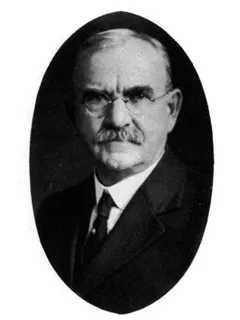Joseph Swain
1902–1921

Joseph Swain (1857–1927), who earned a B.A. and an M.S. from Indiana University, had already turned down the top position at four large western universities when Swarthmore’s Board asked him to allow his name to be submitted to its presidential selection committee. Swain was an attractive candidate since, unlike the College’s past presidents, he already had nine years of high-level administrative experience as president of Indiana University.
His decision to come to Swarthmore was due to the fact that it was the only Hicksite Quaker institution of higher education, and Swain welcomed an opportunity to serve the Society of Friends. However, he only agreed to accept the presidency if certain conditions were met: that the College increase its endowment fund before he would take office and that he as president would have increased power and responsibility, particularly in the hiring of faculty. His already-established stature in the academic world gave him increased leverage in the negotiations. His terms, which the Board accepted, solidified the strength of the president’s position and secured the College’s ability to improve and grow.
Swain’s almost 20-year tenure as president transformed the College. He reorganized the curriculum and degree requirements, added courses and departments, recruited top faculty members, improved and expanded the College’s facilities, and shifted power from the Board to the administration. His efforts set the stage for Swarthmore to emerge as an intellectually rigorous college.
The son of Quaker farmers, Swain spoke out against World War I in a number of forums, including a House of Representatives committee hearing. He was also named a trustee of the World Peace Foundation. However, after the U.S. joined the war, he advocated that the College accept a Student Army Training Corps, to the dismay of many affiliated Friends. Military training itself did not happen on campus but instead took place at Pennsylvania Military College in nearby Chester, Pa.
Swain also faced controversy concerning intercollegiate athletics. After Swarthmore football player Robert “Tiny” Maxwell’s bloodied visage appeared in national newspapers, U.S. President Teddy Roosevelt threatened to ban the sport unless abuses were curtailed. Swarthmore suspended football, but Swain reinstated the sport after one year. Swain also rejected the bequeathed estate of a wealthy Quaker (rumored to be valued at $1 million) because it came with the condition that Swarthmore drop all intercollegiate athletics. Institutional autonomy could not be compromised, Swain said.
As Swarthmore’s reputation grew, so did Swain’s. He became active in national educational and reform efforts, most notably as president of the National Education Association. In 1918, he was elected to the American Philosophical Society. When he retired three years later, Swarthmore had a solid endowment of $3 million and was known as one of the top schools in the country.



